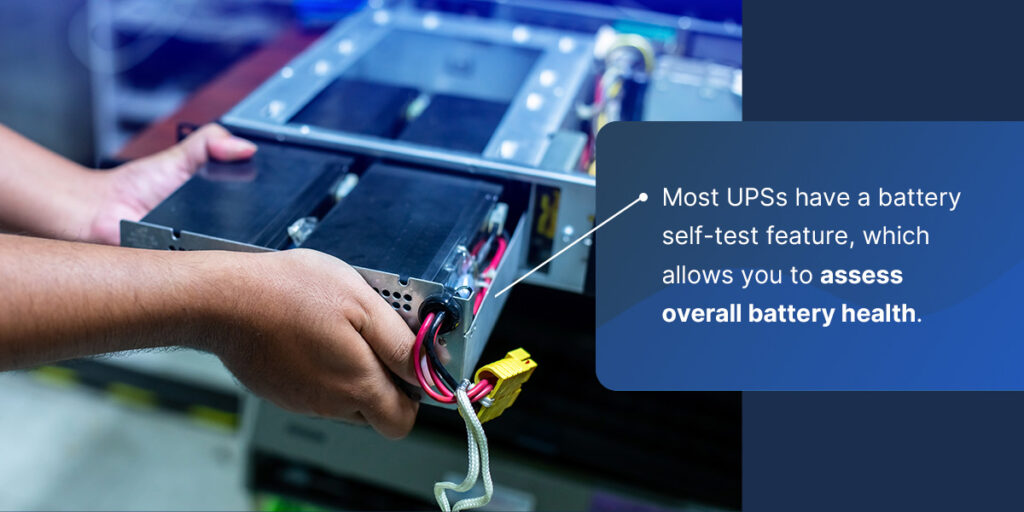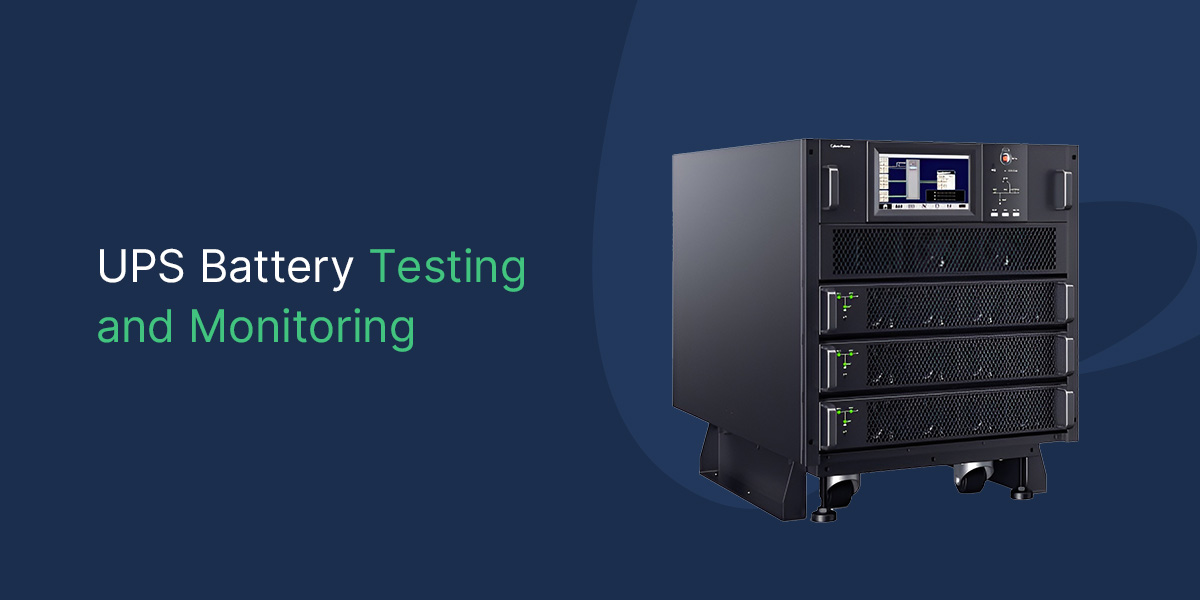As the heart of any uninterruptible power system (UPS), batteries require proper maintenance and testing in order to avert unexpected downtime and costly repairs. It’s well documented that the battery is not only the most vulnerable part of a UPS but also the leading cause of load loss. In fact, up to 65% of UPS failures are battery-related.
Despite their susceptibility, UPS batteries don’t have to compromise your business continuity or uptime. Organizations that partner with a professional service technician to proactively perform UPS battery health checks can be confident that their system will perform as expected when they need it most.
Why Is UPS Battery Testing and Monitoring Important?
An uninterruptible power supply test can confirm whether a battery needs to be replaced. It is a proactive approach to ensure the longevity and reliability of your batteries. If your UPS battery isn’t working as it should, it can significantly impact your business’ productivity and profitability.
Checking UPS battery conditions provides valuable insight into the health of your critical power protection systems. All batteries require regular testing to maximize their lifespan. Checking UPS battery health is also essential to safeguard your facility against the inconvenience and expense of an unplanned power outage.
When a UPS battery is malfunctioning or beginning to fail, you may notice signs such as:
- Unusual behavior like flashing panel lights or repeating alarms
- Shorting out and the inability to supply at least 80% of its rated capacity
- Taking longer to charge or self-discharging earlier than usual
- Displaying a low battery alarm through either an indicator light or sound
Many improvements in battery technology have reduced the threat of unexpected failures, such as advanced charging techniques, software management and firmware upgrades that add intelligence. But none of these capabilities completely eliminate the risk.
Most UPSs include built-in functionality that automatically tests batteries and send an alarm if a fault is detected. More sophisticated UPS backup systems may also include some level of remote monitoring that will alert a technician to issues. However, these measures only provide a general indication of the overall battery health.
The best way to evaluate the battery set is through external testing that assesses individual cell level. This type of UPS battery checkup procedure is generally included as part of a preventive maintenance plan, although it can also be provided as a stand-alone service.
Benefits of UPS Battery Testing
The significant advantages of UPS battery testing are numerous and well-documented. The procedure helps organizations to:
- Maximize uptime and business continuity: One of the most critical tasks of UPS batteries is to ensure ongoing, uninterrupted business operations. You can verify through testing, monitoring and analysis if the battery will perform as needed during a power interruption. This helps avoid lost revenue, expensive delays, significant equipment repairs or replacements, data loss and decreased productivity.
- Keep a constant pulse on battery health: Regular UPS battery testing provides you with valuable data used to anticipate corrective action. System sensors can monitor limited information, but a routine, physical inspection by an experienced professional will generate more information and verify if sensors are performing correctly.
- Avoid costly battery replacements: Issues such as overheating can lead to costly repairs and replacements. Proactive battery testing allows you to monitor battery health and identify potential problems that could result in unplanned battery failure.
- Circumvent equipment failures: Regular testing ensures consistent, balanced voltage to the connected load, helping to prevent inconsistent power, overloaded systems and major damage to the UPS.
- Maintain warranty requirements: A manufacturer’s warranty will usually cover defects and waning performance, but discovering these issues requires regular testing. To maintain warranty requirements, you’ll need to submit maintenance and UPS battery test reports on metrics including voltage testing and temperature.
Meet regulatory compliance requirements: Your industry is likely subject to highly scrutinized regulatory compliance mandates. A regular UPS test ensures you maintain an accurate track record of UPS health to submit as needed.
How to Test a UPS Battery

Most UPSs have a battery self-test feature, which allows you to assess overall battery health. It’s an effective initial step in a routine preventive maintenance strategy, offering an overview of how well the system is working. Keep in mind that the effectiveness of the results can vary depending on factors such as battery age and condition, environment and testing frequency.
Before you begin the self-test assessment, ensure the battery is charged to 100%. Some systems will perform a self-test right when the UPS starts up and then at specific intervals afterward. When the battery is temporarily discharged, the system measures the starting and ending voltage of the battery strings to see if they fall within an acceptable tolerance.
While a self-test can provide you with initial insights into overall battery health, scheduling regular UPS battery testing services with a trained field engineer ensures the most accurate, in-depth results. A technician will have the necessary training and tools to verify self-test results, perform additional assessments and offer recommended next steps. Scheduling professional testing, maintenance and monitoring services will keep your system optimally performing throughout the year.
Types of UPS Battery Testing
There are a variety of UPS battery testing methods that rely on different types of equipment to ascertain health and functionality. The most common include:
Impedance Testing
UPS battery impedance testing is a nonintrusive test used to compile and track the performance history of each battery cell. Typically completed annually, the test makes it easier to identify signs of deterioration or cells with high internal impedance that might require replacing.
The UPS battery impedance tester involves applying an alternating current (AC) to each battery via probes attached to block terminals. With the impedance measured and recorded in milliohms, the test provides a general indication of health without placing batteries under too much stress or requiring them to be taken offline.
Electrochemical Testing
This UPS battery testing procedure compares the batteries to common algorithm conditions, such as electrolyte dry-out and sulphation. Service professionals conduct the test using portable handheld units with probes that measure the frequency response to voltage and current signals passed into the battery.
The results are then cross-referenced for comparison to performance data for healthy batteries. Because electrochemical testing measures sulphation and electrolyte dry-out rather than just impedance, it offers a more detailed summary of battery condition. If a UPS battery test fails, the failing blocks can either be replaced or recharged at a higher rate to reduce sulphation.
Load Bank Testing
UPS battery load testing, also referred to as discharge testing, is the most comprehensive type of battery assessment and the only true method capable of determining the actual UPS battery capacity string. Reviewing the batteries under both normal and peak load conditions identifies which cells hold a charge and which might be approaching the end of service life.
The Institute of Electrical and Electronics Engineers (IEEE) recommends performing a UPS battery load test at the time of installation, then repeating the procedure annually. The main drawback of the UPS battery load test procedure is that the batteries must be taken out of service during the test, which generally takes 24 hours. However, the process can occasionally last for several days.
Partial Discharge Testing
A partial UPS battery discharge test involves discharging the batteries to a maximum of 80%. If an outage or other fault condition were to occur during the UPS battery discharge test procedure, the UPS could still use its 20% available capacity to operate. With this method of UPS battery testing, full capacity is usually restored within eight hours, a much shorter span than with load bank testing.
UPS Battery Monitoring
In addition to battery testing, specialized monitoring systems can measure UPS battery performance. It is recommended that these systems incorporate the parameters identified by IEEE UPS battery testing standards, which include:
- String and cell float voltage
- String and cell change and discharge voltage
- AC ripple voltage
- AC ripple current
- String charge current
- String discharge current
- Ambient and cell temperature
- Cell internal resistance
- Cycles
Unified Power’s UPS Battery Testing and Monitoring Services
Unified Power offers an extensive range of battery testing and monitoring services that cover all UPS models. As a premier national critical power service provider, we provide the expertise and experience to keep your system running as it should. Our trained technicians perform capacity tests in accordance with IEEE UPS battery testing standards, with results reviewed in the field by Unified Power’s technical support team.
A detailed follow-up UPS battery test report is provided to the customer, which outlines performance results and, if applicable, recommendations for repairs or replacements.
Unified Power also offers battery monitoring systems that include daily reports of your battery plant’s life and notification if a battery failure is detected. Our battery monitoring equipment:
- Monitors cell voltages, internal resistance and temperature
- Provides an immediate warning of a specific failing battery
- Records up to 120 days of battery history to allow for trending analysis
- Offers remote monitoring capabilities
- Helps budget for a battery replacement before it becomes an emergency situation
Contact Unified Power for UPS Battery Testing and Monitoring
When maintaining the optimal operation of your UPS, you can trust Unified Power’s team of expert UPS battery testers. We follow a thorough UPS battery inspection checklist to ensure that your critical power equipment will perform as expected when you need it most. Contact us today to find out how we can help you preserve the ongoing health of your UPS batteries!


